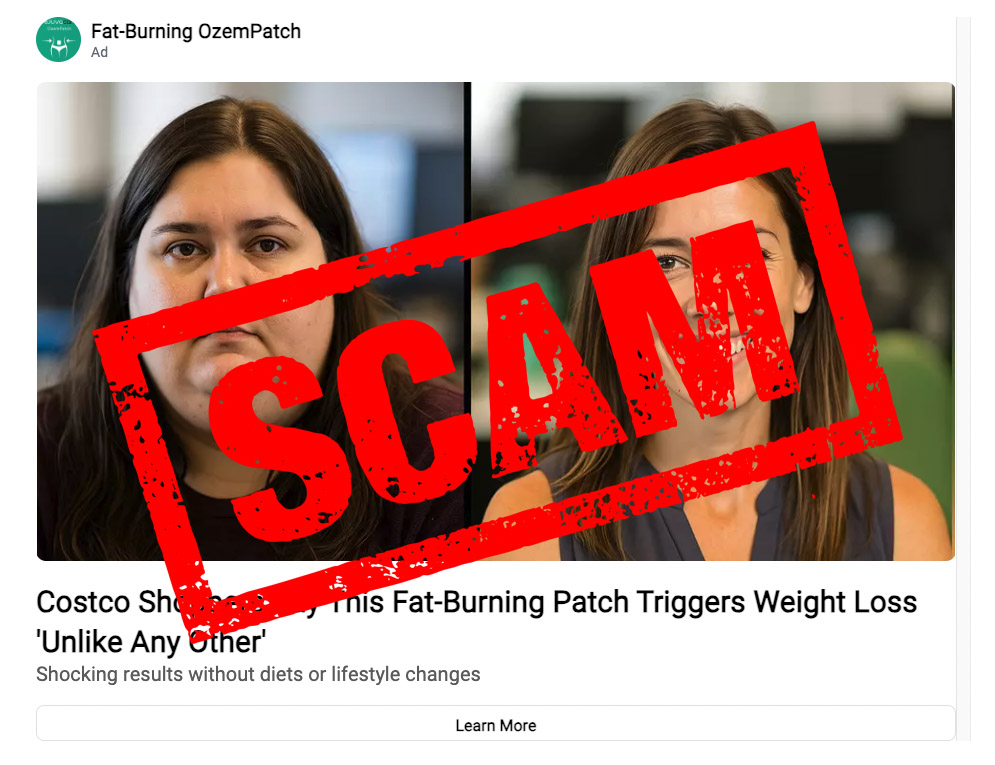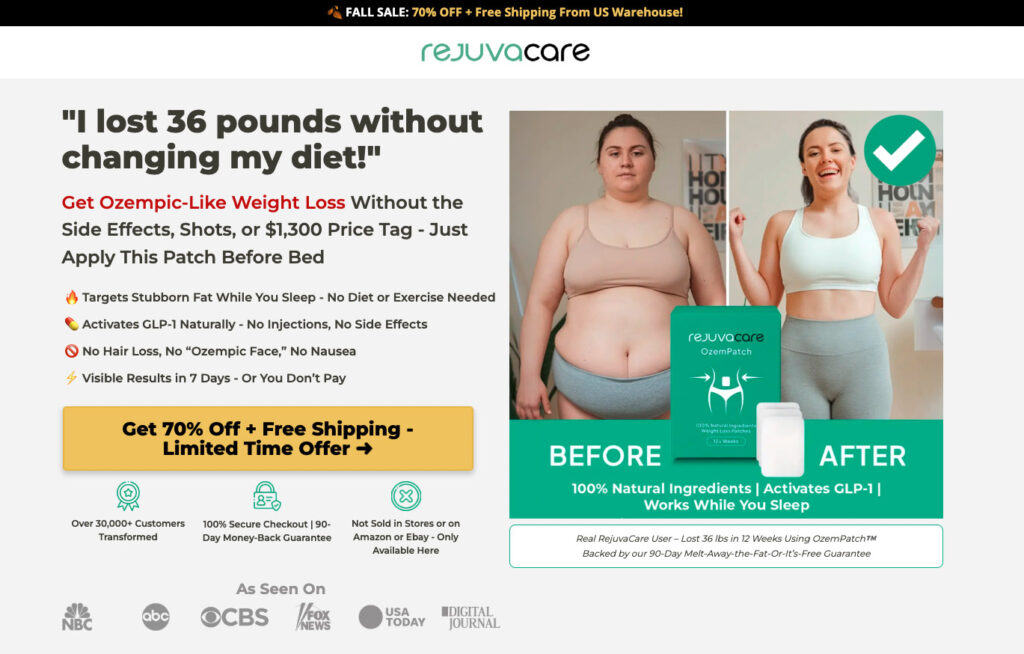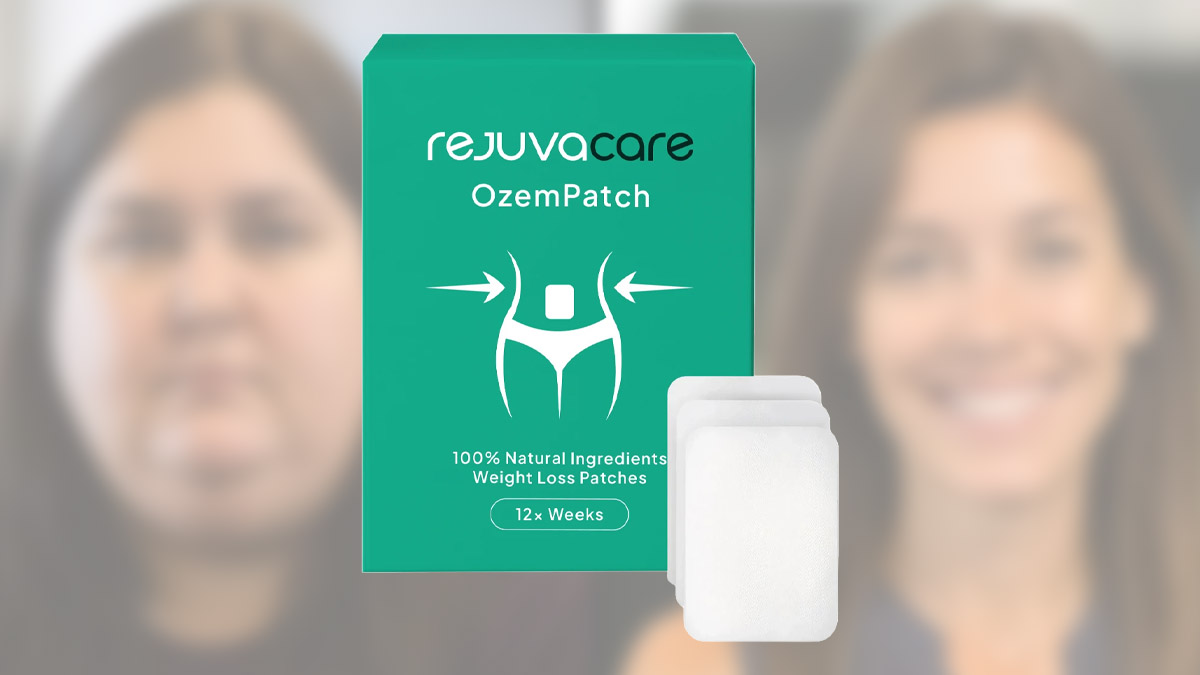RejuvaCare OzemPatch reviews continue to attract attention from shoppers searching for an easy weight loss solution. The patch, sold through rejuvacare.com and healthadvicetoday.com, claims to deliver Ozempic-like fat burning results without injections or side effects. Ads promise effortless results — but the evidence tells a different story.
The so-called “OzemPatch” appears in online promotions using artificial intelligence–generated images, fabricated testimonials, and false claims about media endorsements. The product’s marketing connects to websites that make unverified promises of fast, dramatic weight loss with “no diet or exercise needed.”
An examination of the RejuvaCare OzemPatch offer shows clear signs of deception, from fake transformations to misleading guarantees. The claims that users can “lose 36 pounds without changing their diet” and “target stubborn fat while you sleep” are unsupported.
For further reading, check out a previous scam-busting article about the Spirilet bracelet, offering alleged magical powers for manifestation, as well as another investigation looking into a supposed Apple fall quiz offer for making easy money.
Misleading Costco Claim About RejuvaCare OzemPatch Reviews
One of the most visible RejuvaCare OzemPatch advertisements circulating online in late October 2025 reads: “Costco Shoppers Say This Fat-Burning Patch Triggers Weight Loss ‘Unlike Any Other.’” The message gives the impression that Costco shoppers endorse the patch — yet the product has no connection to Costco at all.

Clicking the ad leads to a fabricated article on healthadvicetoday.com, a website that falsely presents itself as a health and wellness blog. The layout resembles a news site, but closer inspection shows no staff names, sources, or real bylines. Instead, it promotes products like RejuvaCare OzemPatch under headings such as “Top 5 Weight Loss Solutions That Went Viral on Social Media.”
The “before and after” images show women with smooth, unreal facial features typical of AI-generated models. Others appear mirrored or altered to hide their origin. The article claims these products “broke the Internet,” but no verifiable evidence supports that.
The HealthAdviceToday.com Page Raises Red Flags
Visitors landing on the RejuvaCare OzemPatch sales article find a design meant to look trustworthy. It includes sub-brands such as “Beautiful and Chic” and “Better Living” to resemble genuine health magazines. However, links lead only to similar pages selling unrelated supplements and patches.
The page lists supposed “Top 5 Viral Weight Loss Solutions,” placing RejuvaCare OzemPatch among familiar buzzwords like “Ozempic” and “keto.” That association aims to trick readers into thinking the patch belongs to the same scientifically backed category.
Images on the page lack source attribution and appear manipulated. In some cases, reversed text indicates horizontal flipping — a tactic used to evade reverse image searches. The article fails to cite any medical studies, testimonials, or clinical data.
Every clickable link directs users to a sales funnel with language promising a “70% Off + Free Shipping” deal. The site claims more than 30,000 customers have been “transformed,” though no proof is shown.
The “As Seen On” Media Claims Are False
The RejuvaCare OzemPatch sales page repeats a familiar deception used across many online scams: false media endorsements. The website claims the product was featured on NBC, ABC, CBS, Fox News, USA Today, and Digital Journal — but none of those networks have ever mentioned it.

Searches for any trace of those endorsements yield no results. The inclusion of recognizable news logos is a strategy to build fake credibility and convince shoppers that major outlets have validated the patch.
Legitimate products rarely advertise by invoking unverified “As Seen On” claims. This language serves as a psychological trigger, encouraging users to trust the brand instantly. Combined with AI-generated images, these false media references reinforce a false sense of legitimacy around RejuvaCare OzemPatch.
Unrealistic Weight Loss Promises
The RejuvaCare OzemPatch website claims users can experience “Ozempic-like weight loss without the side effects, shots, or $1,300 price tag.” It further promises to “target stubborn fat while you sleep” and deliver “visible results in 7 days — or you don’t pay.”
Such statements are medically implausible. No patch or topical product can replicate the effects of prescription GLP-1 drugs such as Ozempic or Wegovy. These claims rely on the popularity of legitimate medications to mislead consumers into believing the patch provides similar results naturally.
The page also promises “no diet or exercise needed,” which contradicts basic medical guidance. Sustainable weight loss requires calorie management, balanced nutrition, and physical activity — not topical patches.
When a company uses phrases like “no side effects” and “risk-free guarantee,” it signals high-pressure marketing designed to lower skepticism.
The 90-Day Money-Back Guarantee Is a Trap
The RejuvaCare OzemPatch offer advertises an “iron-clad 90-day 100% money-back guarantee.” The text promises full refunds “if you don’t experience the remarkable fat loss that you were anticipating” and claims “no questions asked.”
However, deceptive businesses frequently use guarantees as bait. The goal is to build trust long enough for consumers to complete the checkout process. Once orders are placed, refunds become difficult or impossible.
Customer complaints suggest refund requests often lead to automated responses requiring order numbers that customers never received. Others report being told to ship unused products back at their own expense, sometimes overseas, to qualify for only partial refunds.
When a company relies on empty guarantees to close sales, it’s a red flag that the offer is not genuine.
Suspicious Contact Information and Address
RejuvaCare’s listed contact information includes:
- Email: support@rejuvacare.com
- Phone: (+1) 302-261-9613
- Mailing address: RejuvaCare LLC, 2803 Philadelphia Pike, Claymont, Delaware 19703
At first glance, this appears legitimate. But deeper inspection shows the address belongs to a Global Express packaging and shipping store, not a corporate office. Renting mailboxes from such stores is a common tactic used by companies wishing to appear U.S.-based while operating elsewhere.
A genuine wellness company would operate from an identifiable business address with verifiable staff, not a drop-box inside a mail center. The vague “RejuvaCare LLC” registration provides no insight into who owns or operates the company.
Consumers attempting to call the listed phone number report reaching automated systems that demand an order number before discussing refunds.
Unverified Ingredients and Dubious Science
The product’s promotional material lists a range of herbal ingredients: white peony root, cinnamon, ginger, wormwood, cardamom, tangerine peel, clove, pepper seed, and licorice. The ingredient list even repeats “pepper seed” twice — a careless error often found in hastily assembled scams.
These ingredients are presented alongside claims that they “activate GLP-1 naturally.” No scientific evidence supports the notion that any of these herbs can mimic or stimulate GLP-1 in the body at levels comparable to Ozempic.
Displaying exotic-sounding plant names is a psychological tactic to create the illusion of complexity and ancient wisdom. The website shows glossy AI-generated product images meant to look medical-grade, yet the design lacks the labeling transparency expected of regulated supplements or over-the-counter aids.
If the formulation truly worked, legitimate research or regulatory approval would exist — neither does.
AI-Generated Faces and Stolen Transformations
Throughout the RejuvaCare OzemPatch marketing material, the faces of “customers” appear suspiciously uniform, with overly smooth features and unnatural lighting. These are hallmarks of AI-generated images.
In other sections, “before and after” weight loss photos show realistic bodies but inconsistent lighting, proportions, and image quality. That suggests the company lifted these transformations from unrelated online sources through image searches.
Legitimate brands use verified testimonials with identifiable customers or documented case studies. RejuvaCare instead relies on fabricated visuals to simulate success stories.
Claims like “verified purchase” appear under photos, but no evidence confirms those buyers exist. The repetition of generic transformation narratives is a key sign that the marketing relies on digital manipulation, not real users.
Connection Between RejuvaCare and HealthAdviceToday.com
The RejuvaCare OzemPatch reviews scam sales funnel operates across multiple interconnected domains, including rejuvacare.com and healthadvicetoday.com. The structure is typical of online scam networks that replicate their landing pages under different names.
On HealthAdviceToday.com, the “Buy Now” buttons redirect to the checkout form on RejuvaCare.com. The two sites share identical layouts, fonts, and promotional language. Privacy policy and return links on one domain lead directly to the other, proving they’re managed by the same operator.
This strategy hides accountability by scattering digital footprints. If one domain is reported or flagged, traffic can be rerouted to the next clone.
Trustpilot Reviews Reveal the Real Story
While RejuvaCare’s Trustpilot profile shows a surprisingly high average rating, a closer look exposes manipulation. Many five-star reviews contain nothing more than statements like “I just placed my order.” Reviews like these inflate scores artificially without describing product performance.
The Trustpilot 1-star reviews tell the real story. One reviewer wrote:
“These patches do absolutely nothing and are a total rip-off. Try to get your money back and you are offered 20% to keep them. I want a full refund but can only get one if I send the complete order back and pay extortionate postage.”
Another of the RejuvaCare OzemPatch reviews described unauthorized credit card charges for unrelated “subscriptions,” calling it “a total scam.” Others reported unresponsive support, confiscated shipments, and duplicate billing attempts.
The BBB profile lists complaints of similar nature. Both Trustpilot and BBB reviews align on the same theme: difficulty obtaining refunds and suspicion of misleading business practices.
False Promises of “No Side Effects”
The RejuvaCare OzemPatch site repeatedly assures buyers they’ll lose weight “without side effects” such as nausea, hair loss, or the “Ozempic face.” This phrasing hijacks common search terms from legitimate medication discussions to attract skeptical consumers looking for safer alternatives.
However, no credible clinical testing confirms the product’s safety. Without regulated oversight or verified ingredients, the potential for allergic reactions or skin irritation remains unknown.
The claim of “no injections” is technically true, but the supposed “GLP-1 activation” mechanism lacks foundation. Presenting it as a risk-free shortcut to medical-grade weight loss is deceptive.
Misuse of “Secure Checkout” and “90-Day Guarantee” Labels
The checkout page repeatedly displays trust-sealing phrases like “100% Secure Checkout,” “70% Off Today Only,” and “Free Shipping from U.S. Warehouse.” These are common components of online sales templates used by scam networks.
Terms such as “limited time offer” and “not sold in stores or on Amazon” push urgency. Promises of being “as seen on” major networks and a “melt-away-the-fat-or-it’s-free guarantee” amplify false confidence.
Such exaggerated claims should be viewed as warning signs. Real businesses rely on transparent pricing and clear policies — not psychological pressure tactics or unverifiable badges.
The Fake Discount Tactic
Discount claims play a central role in the RejuvaCare OzemPatch reviews scam marketing formula. Phrases like “70% off,” “fall sale,” and “limited-time promotion” appear across every page.
These deals rarely expire. Reloading the page days later often shows the same countdown timers and banners, proving the urgency is fabricated. By creating the illusion of scarcity, scammers nudge users into impulsive purchases before skepticism sets in.
The language “from U.S. warehouse” and “free shipping” implies domestic stock, but shipping delays and customs hold reports indicate many packages originate overseas.
Unverified Claims About “30,000+ Customers”
The RejuvaCare OzemPatch reviews scam’s marketing boldly declares that “over 30,000+ customers transformed” using the OzemPatch. No data supports that number.
There are no visible user studies, clinical trials, or data collection processes that could yield such a figure. Without a customer verification process, that statement functions purely as advertising fiction.
Numbers like “30,000+” and “90-day transformation” rely on emotional appeal rather than factual evidence. They reinforce the illusion of popularity to trigger social proof, a psychological phenomenon that drives impulsive buying behavior.
Why These Red Flags Matter
Online scams often follow repeatable patterns. RejuvaCare OzemPatch fits nearly all of them:
- Unrealistic claims about rapid, effortless results
- Fake “As Seen On” endorsements
- Misleading money-back guarantees
- AI-generated imagery and stolen photos
- Unverifiable company address
- Overlapping website networks
- False scarcity tactics and inflated review scores
Each red flag alone may not prove deception, but together they create a clear pattern of consumer manipulation.
What Consumers Should Do Instead
Weight management products that promise dramatic fat loss without lifestyle changes are rarely credible. When encountering offers like RejuvaCare OzemPatch, consider these safer alternatives:
- Consult a licensed doctor. Medical professionals can evaluate underlying causes of weight gain and recommend legitimate options.
- Verify product registration. Check if supplements are listed with the FDA or a national health authority.
- Search verified reviews. Look for real user discussions in independent forums instead of promotional sites.
- Avoid “too good to be true” claims. Any product promising rapid weight loss without effort should be questioned.
- Use trusted publications. Outlets like Consumer Reports offer guidance on safe health and wellness products.
How to Report the Scam
Consumers who lost money to RejuvaCare OzemPatch or related sites should take action quickly:
- Dispute charges with the credit card issuer or PayPal.
- Report the site to the Federal Trade Commission (FTC.gov).
- Warn others by posting factual reviews on Trustpilot or BBB.
- Avoid follow-up contact with the seller, as providing more information could expose personal data.
These steps help reduce financial damage and limit the reach of fraudulent operators.
The Bottom Line on RejuvaCare OzemPatch Reviews
RejuvaCare OzemPatch markets itself as a revolutionary “fat-burning patch” that provides Ozempic-like weight loss benefits without medication. However, analysis of its advertising, refund practices, and public reviews exposes a coordinated online scam.
The use of AI-generated imagery, fake news logos, unverifiable testimonials, and a false U.S. address collectively demonstrate deceptive intent. The “money-back guarantee” serves more as bait than protection, and the Trustpilot profile’s imbalance between hollow 5-star and detailed 1-star reviews highlights ongoing consumer harm.
RejuvaCare OzemPatch is not endorsed by any medical professionals, universities, or hospitals. There is no evidence that the patch works, and the company’s credibility collapses under scrutiny. Consumers should avoid purchasing it and rely instead on legitimate, medically approved weight management solutions.
FAQ About RejuvaCare OzemPatch
What is RejuvaCare OzemPatch?
It’s a topical patch marketed online as a weight loss solution that supposedly mimics the effects of Ozempic by “activating GLP-1 naturally.”
Is RejuvaCare OzemPatch legitimate?
No credible evidence supports its claims. Multiple indicators — including fake ads, AI-generated images, and fabricated reviews — suggest it’s a scam.
Where is RejuvaCare located?
The listed address at 2803 Philadelphia Pike, Claymont, Delaware, corresponds to a shipping and mailbox service, not an actual corporate office.
Does the RejuvaCare OzemPatch guarantee refunds?
The company advertises a 90-day guarantee, but customer complaints reveal difficulty obtaining refunds and unauthorized recurring charges.
What do real customers say?
According to Trustpilot, users report being unable to reach support, receiving fake tracking updates, and being charged for unwanted subscriptions.
Is it safe to use?
The patch’s ingredients are unverified, and there’s no clinical testing. Applying unknown substances to the skin could cause irritation or allergic reactions.
What should consumers do instead?
Consult a doctor or dietitian for evidence-based guidance. Reliable health resources, such as Consumer Reports, provide information on legitimate weight loss methods.
How can scams like this be avoided?
Avoid clicking on ads claiming endorsement by major media outlets or showing dramatic “before and after” images. Research company addresses, read low-star reviews, and verify refund policies before purchasing.
Final Word
RejuvaCare OzemPatch reviews reveal a sophisticated but deceptive campaign aimed at exploiting interest in weight loss trends. Every element — from the fake news logos to the AI-generated transformations — underscores the same truth: this is not a real solution.
Consumers seeking safe, legitimate ways to lose weight should look to licensed medical professionals and verified resources, not fabricated websites offering miracle patches.
Editor’s Note: I utilized ChatGPT to help write part of this article. However, ChatGPT used the transcript from a well-researched YouTube video I created about this subject, meaning hard work went into the creation of this scam-busting effort. Scammers use AI to scam people. It’s time we use AI to bust their scams.
